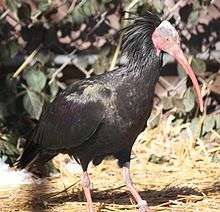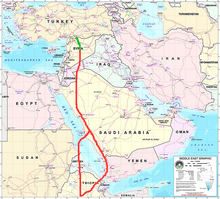Zenobia (bird)
Zenobia is the name given by researchers to a female northern bald ibis, one of the last surviving members of the species in Syria. She is believed to be the only remaining individual who knows the species' migratory route from Syria to wintering grounds in Ethiopia. The annual migration is fundamental to the continued survival in Syria of the species, which is close to extinction in the wild.[1]

Background
Zenobia, a female northern bald ibis, was named for Zenobia, a 3rd-century Queen of the Palmyrene Empire.[1] She is an adult who has nested with her male companion Odeinat.[2]
A 1930 survey reported 3000 individuals of the species around Birecik, Turkey, but in 1990 the wild population in Turkey was declared extinct, at least in part because of the use of dichlorodiphenyltrichloroethane (DDT) insecticide and other human activity. However, in the 1970s and 1980s a captive breeding population was established in the area; these birds were kept in aviaries during the winter, then released in the spring to mate and breed in nearby cliffs; in the autumn they were recaptured for the winter. Thus these birds could survive without knowing the winter migration route used by members of the species in the wild.[3]
The northern bald ibis was thought to be extinct in the Middle East until about 2005, when seven of the birds were spotted nesting near Palmyra. However, by 2012 the Palmyra population had declined to four,[1] of which Zenobia is one.[4]
Ongoing threat
Guards loyal to Syrian President Assad, who were protecting some of the few remaining birds, fled Palmyra in mid-2015 as a result of fighting between Syrian government forces and the Islamic State of Iraq and the Levant; since that time, it is unknown whether the birds, including Zenobia, are still alive.[1][6]
The British Broadcasting Corporation reported that Zenobia is "the only remaining bird who knows the migration routes to wintering grounds in Ethiopia. Without her, birds bred in captivity cannot learn the migration routes and the species could become extinct in the wild in Syria, according to ornithologists."[1]
The Society for the Protection of Nature in Lebanon has offered a US$1,000 reward for information on the whereabouts of Zenobia.[1]
References
- "IS threat to Syria's northern bald ibis near Palmyra". BBC News. 25 May 2015. Retrieved 7 July 2015.
- "The Northern Bald Ibis in 2011 in Syria". International Advisory Group of the Northern Bald Ibis. Retrieved 7 July 2015.
- "Birecik Breeding Center, Turkey". International Advisory Group of the Northern Bald Ibis. Retrieved 7 July 2015.
- Serra, Gianluca (31 October 2012). "Mysteries surrounding the legendary and vanishing oriental bald ibis". Retrieved 7 July 2015.
- Bowden, Chris (27 Feb 2011). "Both Salama & Odeinat are on their way... Zenobia back already!". Royal Society for the Protection of Birds. Archived from the original on 26 May 2015. Retrieved 7 July 2015.
- Bora, Kukil (25 May 2015). "Northern Bald Ibis, Rare Syrian Bird, Faces Extinction After Palmyra Falls To ISIS". International Business Times. Retrieved 7 July 2015.
Further reading
- Last Northern Bald Ibis in Syria?, Northern Bald Ibis conservation project in Morocco
- Les Ibis chauves Salam, Sultan et Zenobia suivis par satellite
- Hopes to save the most threatened bird in the Middle East (includes a photograph of Zenobia), International Union for Conservation of Nature
